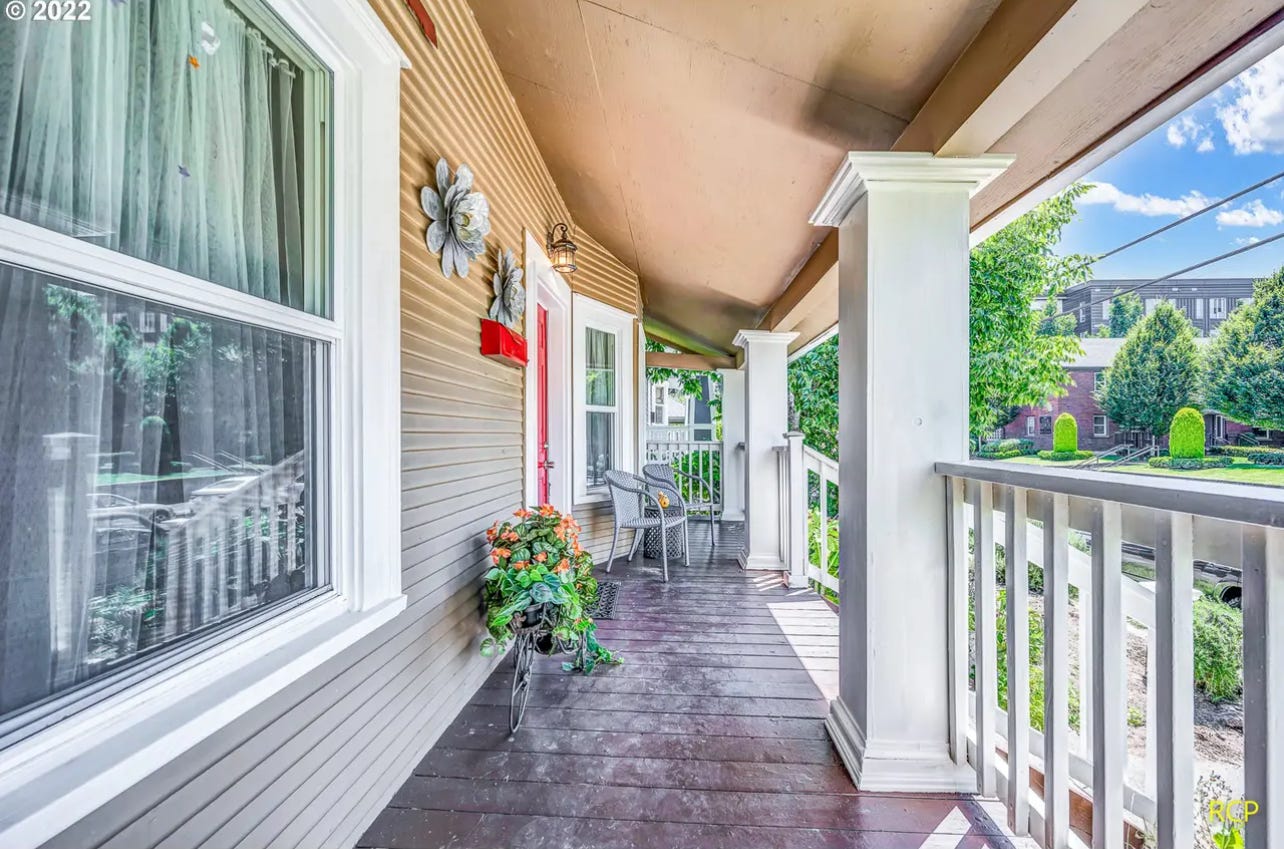PDX HSP 1: Meet Dayrel Poindexter, homeowner
May a Black family man in America’s whitest city show America what it’s capable of
Through Thursday readers who want it can consume this story about reparations. Each day I’ll share a component of this single father’s story, along with easy guidance to becoming your own wealth redistributor.
Are you that affluent someone who left the George Floyd protests anxiously wondering what to do next? These four days are yours.
DAYREL’S HOUSE
Meet Dayrel Marley Poindexter, father of four children, ages 14, 12, 11 and nine. A native of Northeast Portland, Dayrel became a single parent eight years ago, when his wife and children’s mother got addicted to drugs and fell away from the domestic scene.
Over the next four days I’ll be telling you how the Northeast Portland home pictured here was “redistributed” to Poindexter, sharing with you some easily replicable housing wealth redistribution tips, and—via podcast—introducing you to a few of the motivated humans who seek to remedy marginalized Black and Indigenous Portlanders.
Nowhere is America’s need for reparations as expressed through housing more tangible than in Portland. Rip City is the biggest municipality in a not-so-long-ago whites-only state, as well as a city with a raft of race-based policy decisions that have made life all-around hard for local Blacks.
Which brings us to the folks who created an opportunity for the home ownership experience for Poindexter, a dynamic engineer who had the sort of spotty credit report that hounds single Black parenthood. Since 2021 the PDX Housing Solidarity Project has done this again and again to the tune of $1.4 million in funding, as well as home buyer guidance that might just be priceless.
Unless you’re listening to America right, undertaking racial reparations in 2024 sounds cheeky. Statewide campaign efforts are unpopular according to polls, independent of party affiliation. Entire states are working to smother even cursory academic questions into the nation’s enormous racial undertow. Diversity and inclusion initiatives are rapidly being deleted from corporations around the country.
There’s something else out there going on, amongst the under 35 and wealthy, that runs counter to narratives about Texas, Alabama, and Florida regression. Take our example Portland, where ain’t no assuming capitalism is everybody at the party’s jam. And while Oregon is singularly equipped to serve as a reparations start point, its history is the nation’s own, only in caricature.
Sojourn subscribers who aren’t from Oregon might be hip to its racist landmarks and 20th-century policy makers posing for front page photos with hooded Klan leaders, but fewer know how Portland proper has marginalized Black people via housing since 1948’s Vanport flood, a Katrina-esque episode in Oregon history.
Local folks too are up on the enduring chaos visited upon Northeast Portland by the piece of sixties “urban renewal” known as the Emmanuel hospital evictions. In the seventies politicians and businessmen got the Albina area declared blighted, to make way for a Legacy Emanuel campus. A once-thriving community that housed most Black Portlanders through the forties and fifties.
This is why there’s never been a Ron DeSantis sighting in Oregon; one look at how native Black people have had it in this northern state and the Florida Republican would be like, The United State’s shit is super fucked up.
“I’m not in need of charity. I’ve got a good job. I just can’t get there. No matter what I do, I just can’t get there. And I’ve got friends, white kids that are owning property already. They’re younger than me, making less money than me. Why can’t I?”
In 2022, Poindexter, 38, was at a cousin’s after-work BBQ when he heard the wildest housing news from an old friend of his cousin.
Even though Randal Wyatt came up in the nicer Alameda neighborhood on the Eastside, the two had known each other since boyhood, before Wyatt made a local name from his activist-minded raps. A father himself, Wyatt started telling Poindexter about the home that he had just bought. Changed Wyatt’s life in ways he might never have imagined.
Poindexter told his cousin’s friend about the $300,000 loan he’d gotten. His credit was improving, but nothing in his price range was appropriate.
“I got four kids. They’re loud and they’re black,” he said. So shoehorning them into the condo experience was out of the question.
Poindexter had met his wife, a native Hawaiian of the Mormon faith, while they were students at now-defunct Cascade College. They had a cool, fruitful romance and marriage when trouble came eight years ago, a year after the youngest’s birth.
They were living in the Seattle area when, “she started changing,” Poindexter told me. A fight followed the big hard-drug confrontation, his spouse “disappeared to Utah,” and the Poindexter family was absent a mother.
With his engineering degree, Dayrel never struggled to get good-paying gigs, but he had to work like a dog to keep his family in decent housing. In 2015 he googled “cheap places to live” and when Alabama, Mississippi, and Georgia came up, he told the four children, “Well, we’re moving to Atlanta.” Despite knowing no one there, he uprooted his family and made the move. The cost of Pacific Northwest homeownership—especially in his stridently gentrified Northeast Portland stomping grounds—was just that far off the hook.
Georgia was fine. A four-bedroom house rented for $900 a month. Financially, Georgia was cool, but lonely. A brother’s death brought the young father back northwest though. The hunt for a suitable place to raise children.
Where Poindexter has a wiry energy, Wyatt has a cool solidness about him. When Portland reacted with over-the-top-vehemence in the summer of 2020? Wyatt wasn’t so much with it. Needless to say the man understands how Black lives matter. Dude had been studying white supremacy at Portland State and come to believe that yelling in the protest line wasn’t the greatest use of his time.
“I put a couple of things together and began to understand that white supremacy is predicated on land ownership,” Wyatt told me.
So in July of 2020, the musician formed an organization to provide reparations in the form of home repairs for Black-owned housing. He called it Taking Ownership.
Wyatt had been establishing his reparations organization and feeling rewarded by the work when he received an email from some stranger named Annie Moss, titled “Transferring my Home to Black Ownership.”
Transferring Homes to Black Ownership: An Interview With Annie Moss
At first Wyatt overlooked the message, but then he got on the phone with them and learned that Moss preferably repaying a Black family for the hurt caused them by America to making a profit. She was investing in community.
“Taking this kind of action,” observed Allison Brinkhorst, one of PDX HSP’s cofounders, “is probably grounded in having a racial awareness and understanding of the history of racial inequity around wealth and home ownership in the US.”
Moss transferred their home in the historically Black—and very much gentrified—Albina neighborhood to Wyatt’s family, selling it for the amount remaining on the mortgage and redistributing to the homebuyer $414,000 in equity. On December 4, 2020 they closed the deal. And the signing of that paperwork sparked an idea:
Why not keep going?
Wyatt told Poindexter he’d hook him up, to expect to hear from “some people who were starting something to help people like us.” Poindexter received a call from Allison Birkhorst, who wanted to hear his story.
“I’m not in need of charity,” he recalls saying. “I’ve got a good job. I just can’t get there. No matter what I do, I just can’t get there. And I’ve got friends, white kids that are owning property already. They’re younger than me, making less money than me. Why can’t I?”
Tuesday: PDX HSP 2: The night they found Dayrel’s house.
Also: This is my version of journalism busking. Yearning to tip your reporter? @Donnell-Alexander on Venmo is where you can exercise that option. Gracias!
Be Your Own Redistributor
The tips you’ll find in this space through Thursday are all tried and true, courtesy of the PDX Housing Solidarity Project. The names have been changed because this is the way I am.
Redistribute unearned sources of money, such as a tax refund, employee bonus, an inheritance or other unanticipated windfalls.
Example: Taylor redistributed her year-end bonus from her employer to a homebuyer’s down payment fund.
Offer a no-interest loan to a homebuyer.
Example: Barbie gave a homebuyer a no-interest loan for $9,000, which was the amount the IRS owed the prospective homebuyer. This amount enabled that homebuyer to qualify for a mortgage.
RANDAL WYATT is my HSP 1 podcast guest. Before he started Taking Ownership, Wyatt was best known as a musician whose activist bent was just as dominant as his hip-hop inclination.
Randal Wyatt





